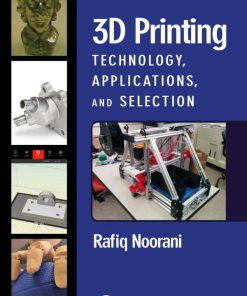The Decentralized and Networked Future of Value Creation 3D Printing and its Implications for Society Industry and Sustainable Development 1st Edition by Jan-Peter Ferdinand, Ulrich Petschow, Sascha Dickel 3319316864 9783319316864
$50.00 Original price was: $50.00.$25.00Current price is: $25.00.
The Decentralized and Networked Future of Value Creation 3D Printing and its Implications for Society Industry and Sustainable Development 1st Edition by Jan-Peter Ferdinand, Ulrich Petschow, Sascha Dickel – Ebook PDF Instant Download/DeliveryISBN: 3319316864, 9783319316864
Full download The Decentralized and Networked Future of Value Creation 3D Printing and its Implications for Society Industry and Sustainable Development 1st Edition after payment.

Product details:
ISBN-10 : 3319316864
ISBN-13 : 9783319316864
Author: Jan-Peter Ferdinand, Ulrich Petschow, Sascha Dickel
This book identifies, analyzes and discusses the current trends of digitalized, decentralized, and networked physical value creation by focusing on the particular example of 3D printing. In addition to evaluating 3D printing’s disruptive potentials against a broader economic background, it also addresses the technology’s potential impacts on sustainability and emerging modes of bottom-up and community-based innovation. Emphasizing these topics from economic, technical, social and environmental perspectives, the book offers a multifaceted overview that scrutinizes the scenario of a fundamental transition: from a centralized to a far more decentralized system of value creation.
The Decentralized and Networked Future of Value Creation 3D Printing and its Implications for Society Industry and Sustainable Development 1st Table of contents:
1 Introduction to the Edited Volume
Abstract
Part I Economies of 3D Printing–Reorganizing Manufacturing
2 The Multiple Applications of 3D Printing: Between Maker Movements and the Future of Manufacturing
Abstract
1 Introduction
2 The End of Mass Production and Consumption?
3 New Concepts of Value Creation
3.1 Top-Down: Mass Customization and Open Innovation
3.2 Bottom-Up: DIY and Peer Production
4 New Patterns of Manufacturing
4.1 Top-Down: Industry 4.0 and Smart Factories
4.2 Bottom-Up: Shared Machine Shops and User Entrepreneurship
5 Transitions
References
3 Bottom-up Economics. Foundations of a Theory of Distributed and Open Value Creation
Abstract
1 Open up or Close Down!
2 Concepts of Production and Value Creation
2.1 Overview of Prevailing Scholarly Concepts
2.2 Integrative Considerations on Value Creation and Production
3 Evolution of Value Creation: From Handicraft to Value Co-Creation
3.1 Traditional Value Creation
3.2 Value Creation Networks
3.3 Interactive Value Creation
3.4 Value Co-Creation
4 Paradigm Change from Value Creation to Value Co-Creation
4.1 Drivers of Change
4.2 Knowledge Is Power
4.3 Commoditisation of Production
4.4 Participation in Value Creation
5 Outline of a Theory of Distributed and Open Value Creation
5.1 Conceptual Foundations of Bottom-up Economics
5.2 Openness as a Concept
5.2.1 Openness of the Value Creation Artefact
5.2.2 Openness of the Value Creation Process
5.2.3 Openness of the Value Creation System Structure
6 Case Studies of Applied Bottom-up Economics
6.1 Open Business Models
6.2 Open Source Ecosystems
7 Conclusion and Outlook
References
4 Can Open Source Hardware Disrupt Manufacturing Industries? The Role of Platforms and Trust in the
Abstract
1 Introduction
2 Parallel Development of FOSS and 3D Printing?
3 Co-emergence of Platforms and Workflows
4 Critical Mass and Obstacles in 3D Printing Projects
5 The Role of Trust in 3D Printing Platforms and Workflows
6 Discussion
References
5 A Critical View of 3D Printing Regarding Industrial Mass Customization Versus Individual Desktop F
Abstract
1 Introduction
2 Additive Manufacturing (3D Printing): A Short Overview
2.1 Classification of Manufacturing
2.2 Working Principles
2.3 History in Brief
2.4 Trends Driving the Development of 3D Printing
2.5 Process Chain
2.6 Scales of 3D Printing: From Prototyping to Mass Customization
3 3D Printing with Plastics
3.1 Technology, Materials and Quality
3.2 Industrial 3D-Printed Applications
3.3 Desktop 3D Printing
4 Business Models and Value Chains
4.1 Co-design and Co-production
4.2 Spare Parts on Demand
4.3 Web-Based Printing Services
4.4 Mass Customization
4.5 Home Printing and Peer-to-Peer Fabrication
5 Sustainability Issues Involving 3D Printing
5.1 Waste Generation, Energy Demand, Carbon Footprint, and Resource Efficiency
5.2 3D Printing for Lightweight Design, Repair, and Use Intensification
6 Future Developments
6.1 Challenges
6.2 Potentials and Opportunities
References
Part II Communities of 3D Printing–Makers, Entrepreneurs, Outlaws
6 Fabrication Laboratories (Fab Labs)
Abstract
1 Fabrication Laboratories (Fab Labs)
2 The Revival of Publicly Accessible Workshops
3 The Rise of the Maker Movement
4 Community and Commons-Based Places for Value Creation
5 Infrastructure for Grass-Roots Dynamics
6 Early-Adopters for Accessible 3D Printing
7 Public and Media Perception
8 Scope of Applications in Fab Labs
9 New Modes for Collaborative Production
10 Limitations and Shortcomings
11 Implications for Sustainability
References
7 Open Source Hardware Startups and Their Communities
Abstract
1 Introduction
2 Conceptual Framework
2.1 Communities as Seedbeds for Distributed Innovation
2.2 Open Source Communities and Entrepreneurship
2.3 RepRap and the Origins of Open Source 3D Printing
2.4 Startups and Business Models
3 Research Design
4 Findings
4.1 Community
4.2 Interaction Between Startups and Community
4.3 Business Models
5 Discussion
6 Conclusion
References
8 Distributed Manufacturing in the Shanzhai-Schumpeterian Innovation State
Abstract
1 Introduction
2 Overview of Legal Highs
3 Drugs and Definitions
4 Theory on the Sovereign, Law and the State of Exception
5 Outlaw Innovation: The Last Frontier
6 Conclusion
References
Part III Futures of 3D Printing–Trajectories and Applications
9 Materializing Digital Futures
Abstract
1 Introduction
2 Prosumers and Digital Futures: From Web 2.0 to 3D Printing
3 Architectures of Digital Futures: Complexity Reduction
4 The Technopolitics of Digital Futures: Contextualizing Utopias
References
10 3D Printing as Driver of Localized Manufacturing: Expected Benefits from Producer and Consumer Pe
Abstract
1 Introduction
1.1 Drivers Towards Localized Manufacturing
1.2 Objective and Overview
2 3D Printing as Means to Localized Production
2.1 Advantages of Centralized Mass Production
2.2 Redesigning Production with 3D Printing Technologies
2.3 Advantages of Decentralized Production in 3D Printing Enabled Mini-Factories
2.4 A Middle Ground: Decentralized Mini-Factories with Centralized Pre-production
3 3D Printing as Means to Localized Customer Co-creation
3.1 Online Product Configuration Versus Retail Stores
3.2 Autonomous User Production
3.3 A Middle Ground: “FabStores” for Localized Customer Interaction
4 Empirical Analysis
4.1 Expert Survey
4.1.1 Sample and Approach
4.1.2 Results
4.2 Consumer Survey
4.2.1 Sample and Approach
4.2.2 Results
5 Conclusion and Outlook
References
11 Assessing the Environmental Impact of Decentralized Value-Chain Patterns Involving 3D Printing Te
Abstract
1 Introduction: 3D Printing and Its Ambiguous Impact on Sustainability
2 Environmental Effects of 3D Printing: Current Research
3 Case Studies
3.1 Methodological Basis
3.2 Mass-Produced Consumer Product: The Cell Phone Shell
3.2.1 Scenarios for Production of the Cell Phone Shell
3.2.2 Economic and Logistics Variations in Cell Phone Shell Production
3.2.3 Comparison of the Ecological Effects of Cell Phone Shell Value Chains
3.3 Commercial Class-A Item: Aircraft Replacement Part
3.3.1 Scenarios for the Production of an Aircraft Replacement Part
3.3.2 Economic and Logistical Variations in the Production of an Aircraft Replacement Part
3.3.3 Ecological Effects of Value Chains for an Aircraft Replacement Part
4 Discussion: Environmental Impact of the Implementation of 3D Printing into Value Chains
5 Summary and Outlook
References
12 How Decentralized Technologies Can Enable Commons-Based and Sustainable Futures for Value Creatio
Abstract
1 Introduction
2 Delineating the Future of Manufacturing
2.1 The Linking of Production and Services
2.2 Sustainability
2.3 Transformative Relevance of Bottom-up Approaches
3 Impacts of 3D Printing
3.1 Aligning Technological Capabilities with Business Models
3.2 3D Printing’s Possible Impacts on Sustainability
4 Leveraging the Path of Sustainable Value Creation
5 Conclusion
People also search for The Decentralized and Networked Future of Value Creation 3D Printing and its Implications for Society Industry and Sustainable Development 1st:
the future is decentralized
decentralized networks the future internet
the decentralized bank of the future
a decentralized communication network
the future will be decentralized
Tags: The Decentralized, Networked Future, Value Creation, 3D Printing, Sustainable Development, Jan Peter Ferdinand, Ulrich Petschow, Sascha Dickel
You may also like…
Education Studies & Teaching
Politics & Philosophy
Business & Economics - Responsibility and Business Ethics
Business & Economics - Mathematical Economics
Business & Economics
Co Creation Innovation and New Service Development The Case of Videogames Industry Jedrzej Czarnota












